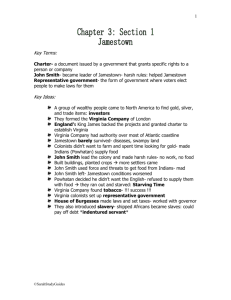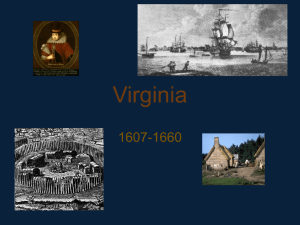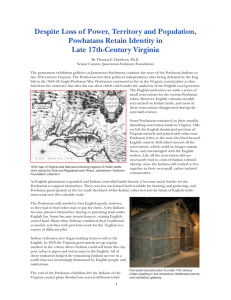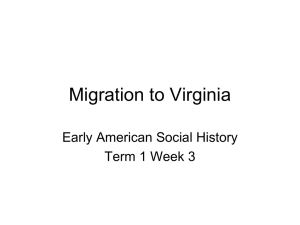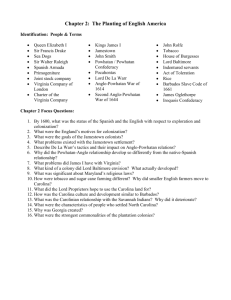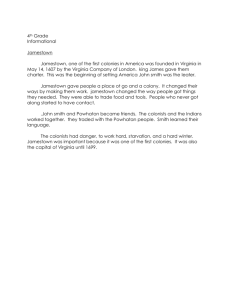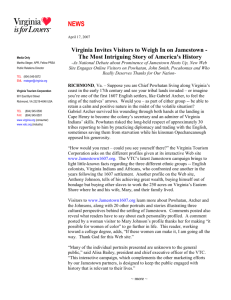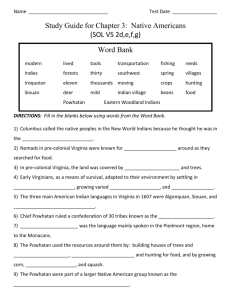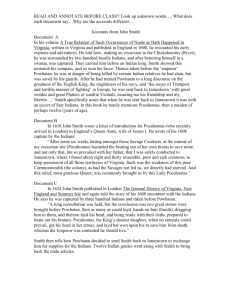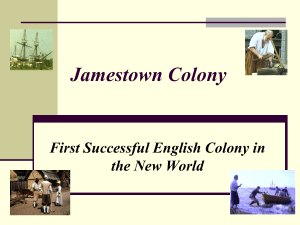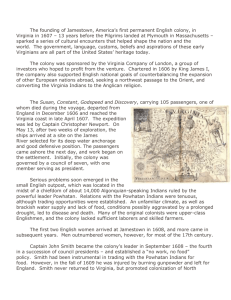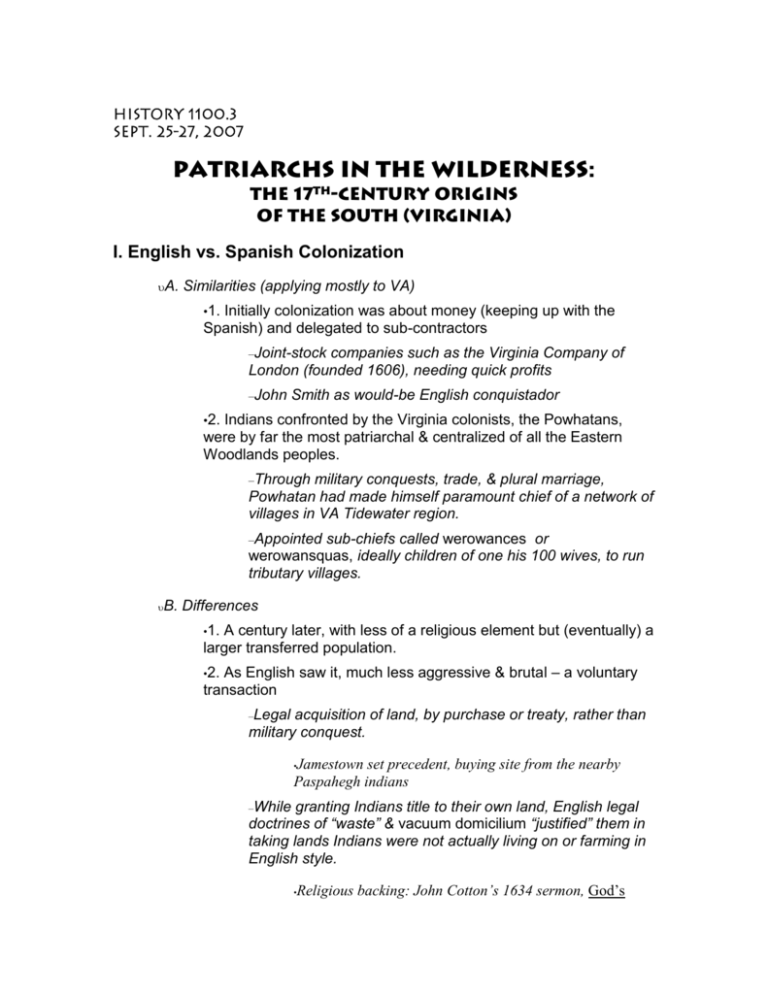
History 1100.3
Sept. 25-27, 2007
Patriarchs in the Wilderness:
The 17th-Century Origins
of the South (Virginia)
I. English vs. Spanish Colonization
A.
Similarities (applying mostly to VA)
•1.
Initially colonization was about money (keeping up with the
Spanish) and delegated to sub-contractors
–Joint-stock
companies such as the Virginia Company of
London (founded 1606), needing quick profits
–John
Smith as would-be English conquistador
•2.
Indians confronted by the Virginia colonists, the Powhatans,
were by far the most patriarchal & centralized of all the Eastern
Woodlands peoples.
–Through
military conquests, trade, & plural marriage,
Powhatan had made himself paramount chief of a network of
villages in VA Tidewater region.
–Appointed
sub-chiefs called werowances or
werowansquas, ideally children of one his 100 wives, to run
tributary villages.
B.
Differences
•1.
A century later, with less of a religious element but (eventually) a
larger transferred population.
As English saw it, much less aggressive & brutal – a voluntary
transaction
•2.
–Legal
acquisition of land, by purchase or treaty, rather than
military conquest.
Jamestown set precedent, buying site from the nearby
Paspahegh indians
•
–While
granting Indians title to their own land, English legal
doctrines of “waste” & vacuum domicilium “justified” them in
taking lands Indians were not actually living on or farming in
English style.
Religious backing: John Cotton’s 1634 sermon, God’s
•
2
Promise to His Plantations
European customs regarding labor & gender as key
elements of “true” ownership as English saw it.
•
–Spanish
conquered land, English “commodified” it
II. The Jamestown Disaster (skipped in class, 2007)
A. Powhatans & English fight to a draw
•1.
Smith & Powhatan each maneuvered to be patriarch over the
other.
The Smith-Pocahontas legend: an adoption that became a
seduction & penetration
–
Smith’s self-promoting writings
–
Legend underwrote Anglo-American claim that their
Indians consented to colonization
•
Powhatan’s tactical error: believing English could be
incorporated into his own chiefdom.
•2.
Kept English alive with corn supplies
–
Underestimated English based on Indian gender
stereotypes
–
As sexual/familial diplomacy failed, both sides turned to
force, especially Smith
–
Powhatan agreed to the strategic marriage of Pocahontas
after her kidnapping
–
B. The Failure of the Virginia Company
•1.
Incompetence at Jamestown: inappropriate colonists, poor site,
cannibalism.
•2.
Saving the situation:
Martial law: Laws Divine, Moral, and Martial (1609-1611)
–
Switched colony’s focus to commercial farming: John
Rolfe’s introduction of tobacco
–
Opechanacanough’s revenge: 1622 uprising caused failure
of company, made Virginia a royal colony
–
III. 17th-Century Virginia and the Beginnings of Southern Society
A. Land of the Unfree
1. Early labor system: white indentured servants, often convicts
•
3
sentenced to “transportation” or poor people lured on false or
exaggerated promises.
Among exaggerations: female servants not supposed to
work in fields; “freedom dues” & opportunities to become
independent farmers once term was up
–
2. Seeds of slavery sown in the way southern laborers were
mistreated & disrespected
•
Binding people to service & extending terms of service
major forms of punishment
–
Servitude far more common in the colonies than Europe
–
B. 17th-Century Virginia Society
1. Heavily male, young, & unfree
•
2. Aggressive economic & social behavior
•
3. Rampant disease, high death rates, & low life expectancies
•
4. Weak communities: dispersed settlement – no cities & few
community institutions
•
Planters dealt directly with British traders to sell crops & buy
supplies & manufactured goods
–
Church of England came over in a weakened state – priests
paid in tobacco
–
Few schools or colleges – College of William and Mary not
founded until 1693.
–
5. Ethic of “looking out for number 1,” keeping $ within family
•
C. The Paradox of Patriarchy in the New World
Low life expectancies in 17th-century South created many femaleheaded households & opportunities for women to cross normal
boundaries
•
Partly in response to this, colonial governments strengthened the
hand of patriarchs with household government laws tighter than
those in Europe
•
Extending a European trend, colonies diminished other
institutions (church, extended families, common law rights
like dower & entail) that might intervene in families on behalf
of dependents, protect property rights of wives
–
On paper, heavy responsibility for maintaining social order
placed on household heads
–
Patriarchy grew more powerful in South, but became largely
•
4
privatized, centering all power in heads of households, w/o father’s
traditional superiors (God & King).

